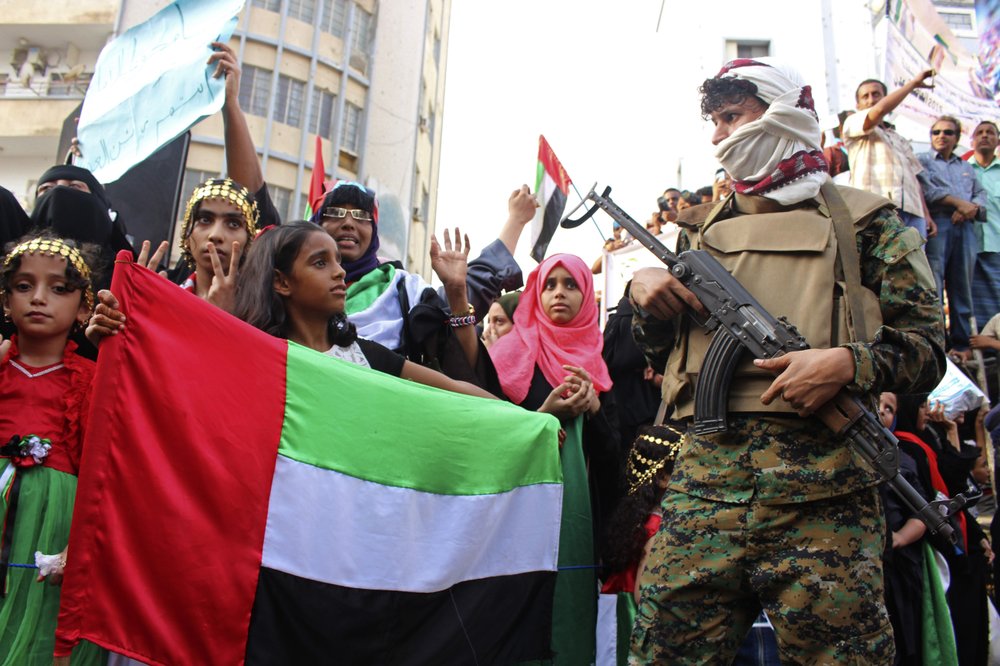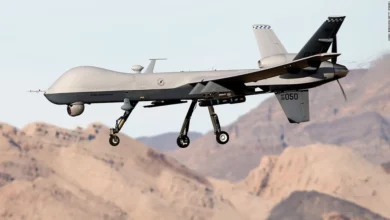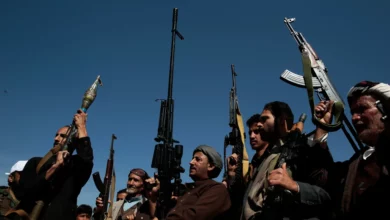Sanaa – Amid a lingering security vacuum in violence-stricken Yemen, clashes between Islamist militants and state security continue to rage in the country’s south with Al-Qaeda leaders claiming an expansion of influence in Abyan Governorate.
Armed groups seized control of Zinjibar, the capital of Abyan, more than two weeks ago and have aggressively fended off assaults on the city since. They reportedly occupy the city’s main bank and police station, among other areas of vital interest.
Al-Qaeda leaders confirmed to Al-Masry Al-Youm the group is cooperating with other militants to wage combat against US and Yemeni forces. American fighter jet and drone strikes in Abyan – denied by the White House – have drawn local support and sympathy to the group in recent weeks, Al-Qaeda claims.
“The armed groups [including Al-Qeada] are controlling everything in Abyan. Al-Qeada today is more powerful than ever [in Yemen],” said Rashad Abu al-Feda, a leading Al-Qaeda figure in the country. “The force by the state provoked everybody to be armed and made them one hand.”
Abu al-Feda says different political players in Yemen are using the militant threat to gain US backing.
“All the country’s main components – the defected army, the loyal army, the opposition, and the state – everybody is vowing to fight Al-Qaeda to gain US trust,” said Abu al-Feda, adding that the assault on Zinjibar plays into that scheme. “This…makes more people join us in the field.”
Presidential information officer Ahmed al-Sofi says Al-Qaeda militants are even taking their pressure to another level by jockeying to become a major political factor in the country’s fractured and embattled political landscape.
“Al-Qeada wants to be brought to the table to be an equal to the Joint Meeting Parties,” said Sofi.
Abu al-Feda says the militants in Abyan are a disparate combination that includes Al-Qaeda members, other Jihadists and “ordinary” Yemenis who have all rallied together under the banner of “fighting the regime.”
“Crises always gather victims together,” said Abu al-Feda.
“The (non-Al-Qaeda] Jihadist might be the biggest group among the warriors because of their experience on the ground,” he added.
These Jihadist groups label themselves different names. One such moniker is “Sharia advocators.”
Clashes in Abyan have fueled a displacement crisis that has affected over 1300 families. Those fleeing the violence are seeking refuge in 42 schools-turned-makeshift shelters in Aden, the southern port city. Other families are staying with relatives, rendering the total number of displaced individuals unknown.
“We tried to help those who were located in Aden’s schools,” said Aez al-Dein Dheef al-Allah, the head of emergency department at the Islamic Relief organization. “We supplied each family with 10 kilos rise, 25 kilos of flower and 4.5 liters of oil.”
Abu al-Feda denies Al-Qaeda is responsible for the crisis. Instead, he attributes the blame solely to Yemen’s central government and the United States.
“The displacement of people is a result of the usage of extreme force from the military and the US regime,” said Abu al-Feda. ”People fear the air strikes and heavy guns…the armed groups target military locations only.”
Abdellah Ali Saeed, head of state security in Mudia, Abyan, told Al-Masry Al-Youm fighting has ceased in the area but the threat of an eruption of violence looms.
“The road in rural places of Mudia is passed by Al-Qeada members.” said Saeed. “The security forces can’t stay on these roads as Al-Qeada is stronger there.”
Saeed accused government officials of not providing security with adequate assistance. Locals told Al-Masry Al-Youm they believe state security orchestrated the instability in order to prove southern Yemen is a haven for terrorists, justifying both the crackdown and the contentious need to keep southern and northern Yemen united.
Saleh brought the two regions of the country, previously divided into two nations, together in 1990, creating the Republic of Yemen.
Defected Lieutenant Colonel Mohammed Khanbash, who resides 20km from Zinjibar, argues the government, at minimum, enabled armed groups to easily seize control of the city.
“The armed groups are few in Abyan,” said Khanbash. “They would never take over the city if it wasn’t for the regime.”
Khanbash confirmed that US drone strikes took place in the area.
“Two weeks ago they struck close to my home,” he said. “It was a very modern drone but the striking was random.”
Khanbash says those displaced from Zinjibar are seeking refuge in many small villages in the area, including his own. Availability of quality food, he says, is adding to their woes.
“Not only do we suffer from the high prices but sometimes we buy expired food as we don’t have other choices,” said Khanbash.
Presidential information officer Sofi told Al-Masry Al-Youm the lack of sufficient foodstuffs was the result of a concerted government effort.
“The state, in order to fight them [Al-Qaeda], is preventing the necessities and food from entering Aden port,” said Sofi.
State security launched an assault on Huta last Tuesday to root out militants who had infiltrated the town. Locals, however, confirmed that the suspects were local militants, not affiliated with Al-Qaeda.
“There were explosions the whole night. The armed groups were mingling in the city. No one stopped them but the fight started when we heard that they aimed to control the bank,” said one Huta resident. “The security forces fight only when it comes to money. But when there’s exposure to danger for regular people, they don’t care much.”




